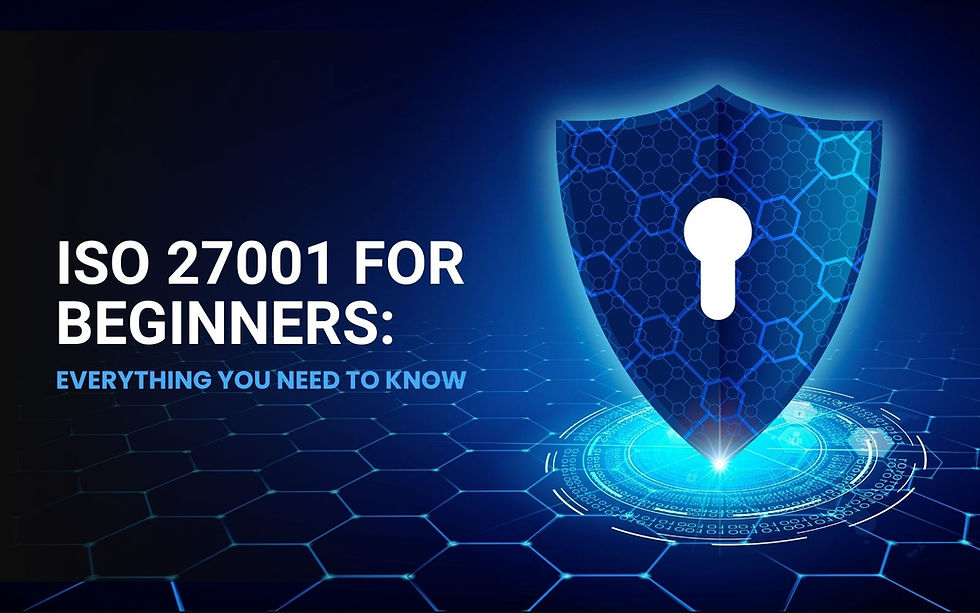A Guide To Privacy Information Management System Certification
- osscertification20
- Mar 9, 2024
- 3 min read
Data security has grown in importance in the modern digital era, impacting both individuals and organizations. It is critical to have strong procedures in place to guarantee the privacy and security of this information, given the growing dependence on technology and the massive volumes of data being collected. Privacy Information Management Systems (PIMS) are useful in this situation. To handle and secure personal data by applicable regulations, such as the ISO 27001 Certification, a PIMS is put in place.
A PIMS can be defined, implemented, maintained, and enhanced by the requirements of ISO 27701:2019, an international standard. It lays out steps to successfully reduce risks associated with privacy breaches and helps organizations detect these risks.
Organisations can be proactive in protecting data by implementing a Privacy Information Management System (PIMS). They can use it to set up transparent procedures for handling personal information at every stage of their lifetime, from collecting it to storing, transferring, and finally disposing of it.
One way for organisations to show they care about people's right to privacy is to implement a Privacy Information Management Systems approach. This guarantees adherence to relevant data protection rules and regulations while simultaneously enhancing customer trust.
Essential Concepts and Criteria of ISO 27701
As an extension of ISO 27001 and ISO 27002, the Privacy Information Management System (PIMS)—also called ISO 27701—adds to the framework for managing privacy inside an organisation. It provides a framework for the design, implementation, maintenance, and ongoing improvement of a privacy information management system.
Scope and Applicability are two of the most important aspects of ISO 27701's important principles and standards.
Scope and Applicability
Public and private companies, government entities, and non-profits of all sizes are all welcome to adopt and implement ISO Certification.
Analyzing Potential Dangers
To identify, assess, and control privacy threats, businesses should conduct risk assessments regularly.
Privacy Policy
Businesses are required by the standard to establish a privacy policy that reflects both their legal responsibilities and their desired outcomes for customer data protection.
Roles and Responsibilities
Appointing an individual or team to oversee privacy management is just one of many privacy-related duties that organisations must outline.
Data Subject Rights
Data subjects have the right to access, rectify, erase, restrict processing, and transfer their data, and organisations must establish policies to handle these rights.
Consent Management
When data processing requires consent from data subjects, the standard states that organisations must manage that request.
Data Breach Notification
Companies should have procedures and policies to find, report, and investigate data breaches.
Training and Awareness
Organisations must raise awareness and educate their employees and other stakeholders on the importance of privacy and data protection.
Constant Development
A continuous improvement of the Privacy Information Management System is encouraged by the standard.
Third-Party Management
Before sharing personal information with third parties, the organisation must ensure that it has adequate security measures in place.
Numerous advantages might accrue to organisations that adopt ISO 27701.
Private Data Protection Made Easier
Companies can improve their privacy management by constructing and refining personal information management practices by ISO 27001 Certification. In addition to assisting companies in meeting regulatory requirements, this has the potential to boost consumer satisfaction and trust.
Meeting all required regulations
Several jurisdictions have strict regulations on data privacy, such as the EU's General Data Protection Regulation (GDPR). By implementing ISO Certification, organisations can demonstrate their adherence to these regulations and potentially avoid financial penalties.
Managing Risks
Through the identification and management of privacy issues, organisations can prevent or mitigate potential breaches of personal information. Doing this can help them save money and keep their reputation intact.
Benefit from the Competition
Achieving ISO 27001 Certification might help businesses stand out from the competition. In markets where personal data protection is paramount, this can work to their advantage.
Conclusion
Adherence to well-specified procedures can help the business owner limit the likelihood of health dangers. For companies to uphold a trustworthy and honorable reputation, rule compliance is paramount. It aids businesses in staying out of trouble with the law and warding off allegations of regulatory and food safety infractions.



Comments